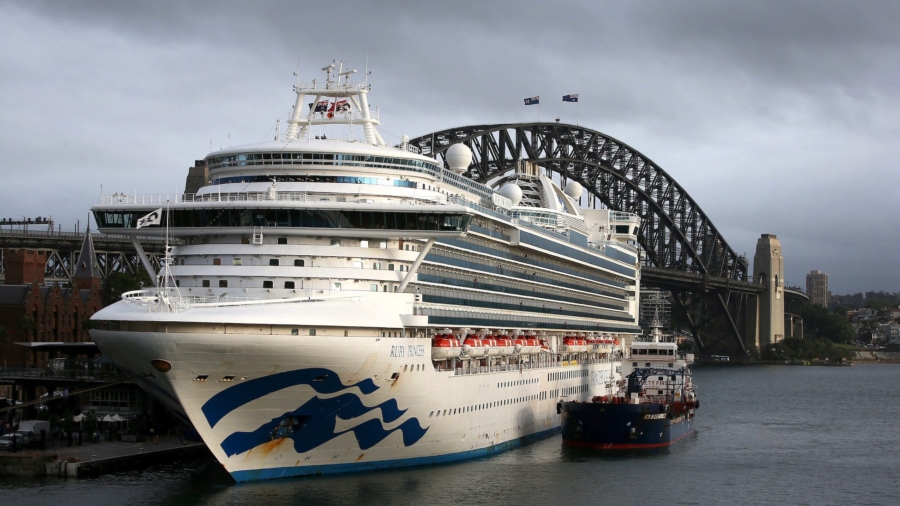In an Australian class-action lawsuit on Wednesday, cruise operator Carnival was ruled negligent in its duty of care to passengers for failing to cancel a voyage out of Sydney that led to a significant COVID-19 outbreak.
The Ruby Princess ocean liner departed Sydney on March 8, 2020 with 2,671 passengers on board for a 13-day cruise to New Zealand. The ship returned after 11 days as Australia’s borders were closing for lockdowns.
During the cruise a quarter of its passengers—663 in total—fell ill with COVID-19. 28 of those would ultimately die from the illness.
Passenger Susan Karpik was the lead plaintiff in the case against British-American cruise operator Carnival Corp.
Australian Federal Court Justice Angus Stewart ruled that the cruise operator had been negligent as defined by Australian consumer law.
“I have found that before the embarkation of passengers on the Ruby Princess for the cruise in question, the respondents knew or ought to have known about the heightened risk of coronavirus infection on the vessel and its potentially lethal consequences, and that their procedures for screening passengers and crew members for the virus were unlikely to screen out all infectious individuals,” Mr. Stewart said.
Carnival had already experienced COVID-19 outbreaks on its cruises in the previous month aboard the Grand Princess off California, and the Diamond Princess off Japan, Mr. Stewart said.
The judge stated that the operator had failed to explain why it offered free cancellation for all cruises worldwide leaving from March 9—the day after the Ruby Princess left port—but waited to suspend all cruises until March 13, despite a quarter of the passengers on board the ship having fallen ill.
“To the respondents’ knowledge, to proceed with the cruise carried significant risk of a coronavirus outbreak with possible disastrous consequences, yet they proceeded regardless,” Mr. Stewart said.
After the verdict, the main plaintiff and her lawyer addressed reporters outside the courthouse.
“I was very pleased with that finding. And I hope the other passengers are pleased with that finding too,” Ms. Karpik said. “It’s been a long journey for a good percentage of those cruise passengers.”
“I do hope they [Carnival] take the time to read the information that we’ve given them about our experiences and look after their passengers better,” she added.
Ms. Karpik’s lawyer, Vicky Antzoulatos, noted the significance of the outcome of the trial.
“This is the first successful cruise ship class action in the world. So I think cruise ships will be … paying attention to this case and the comprehensive findings that the court made,” she said.
Ms. Karpik had sued Carnival for more than AU$360,000 ($230,000), but was only awarded her medical expenses of roughly AU$4,400 ($2,800). Among other reasons, this was because Ms. Karpik only suffered relatively mild COVID symptoms, and that the cruise liner had refunded all of the passengers’ fares.
Ms. Antzoulatos said those who suffered more serious consequences from the illness could see larger payouts, such as Ms. Karpik’s husband, who she said almost lost his life and had to spend two months in hospital to recover.
“Susan’s husband was very catastrophically injured, so we expect that he will have a substantial claim, and that will be the same for a number of the passengers on the ship,” Ms. Antzoulatos said, adding that each passenger will have to prove their claims in court—unless Carnival agrees to settle.
Carnival Australia said in a statement that it was considering the judgment in detail.
“The pandemic was a difficult time in Australia’s history, and we understand how heartbreaking it was for those affected,” Carnival said.
The Associated Press contributed to this report.

